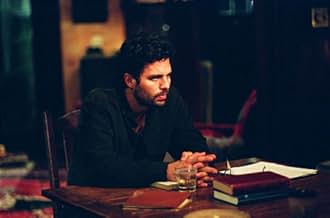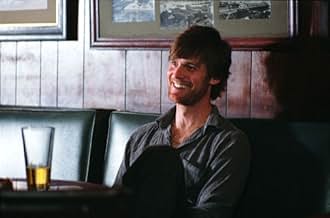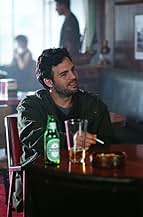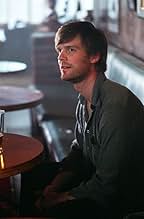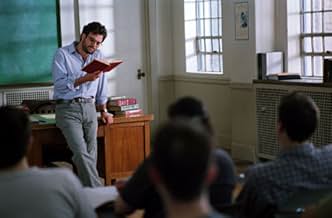An indiscretion between two close friends tears down their respective marriages.An indiscretion between two close friends tears down their respective marriages.An indiscretion between two close friends tears down their respective marriages.
- Awards
- 2 wins & 4 nominations total
- Director
- Writers
- All cast & crew
- Production, box office & more at IMDbPro
Storyline
Did you know
- TriviaThe Irish step dance scene starts with a cutaway where the center dancer is actually a male dancer.
- Quotes
[on Hank and Terry]
Edith Evans: I think he want to have sex with her.
Jack Linden: Why?
Edith Evans: Why?
Jack Linden: Yeah.
Edith Evans: Because he likes her and she's pretty. And he hasn't had any strange pussy since that French cunt.
- Crazy creditsSpecial Thanks To Christine & Ben Christine, Terry & Kelly Kris & Fisher
- ConnectionsFeatured in The 20th IFP Independent Spirit Awards (2005)
- SoundtracksJungle Warrior
Written by John Otieno
Performed by Matata
Courtesy of President Records Ltd. UK
Featured review
An ernest dose of claustrophobia
We Don't Live Here Anymore begins with two couples having a semi drunken party. At least Terry (Laura Dern), Jack's wife, is getting drunk, a thing she does pretty often. They've run out of beer and Jack (Mark Ruffalo) and Edith (Naomi Watts), who's the wife of Hank (Peter Krause) go to get some. Later that night the first fight occurs between Jack and Terry. This isn't the first time Jack has run off with Edith on little improvised errands and they've come to make Terry suspicious -- and she's right: Edith and Jack are soon getting it on outside on a blanket. The two couples' lives are intertwined. Jack and Hank work in the same college English department, Jack teaching literature and Hank creative writing, an activity at which he is not a success, though acceptance of one of his poems by The New Yorker is one of the few positive and non-adulterous events in the movie. The two men also go out on runs together -- sweaty, huffy, ridiculously competitive and un-fun slogs on deserted roads, followed by a beer at a pub. Edith and Jack continue to sneak off to have sex, Terry remains suspicious, and Hank doesn't seem to care either about Edith or about anybody but himself and his unsuccess, though being a habitual philanderer often on the prowl (mostly for girl students), he eventually he scares up some lust for Terry, who's eager for that kind of revenge once she knows what Jack is up to.
There's no question about the fact that Ruffalo, Watts, Dern, and Krause do their best to flesh out what, by the film's end, still appear to be rather undefined roles underwritten and equally unsimpatico. There's no doubt about Terry's volatility and anger and Edith's cool withdrawal and intense need. Hank is laid back and self absorbed, and in one of his typically complex portrayals of a ne'er-do-well, Mark Ruffalo as Jack combines needy, querulous, hostile, and sexy with a resultingly vivid but unappealing effect -- which one could also say for Laura Dern's energetic and committed portrayal. The actors do interesting (if somewhat unrewarding) work; they're better than the material. So are the designer, who's composed wonderful interiors, and the cinematographer, who has made them translucent and real. But this is a drama so focused on adultery that the adultery itself remains incompletely described as an experience. Where's the guilt? Where's the excitement? We Don't Live Here Anymore has too little to say about anything else in life other than the mechanisms of infidelity including the way children get caught in the crossfire. Though there is plenty of drinking and some smoking (Edith and Jack indulge in the latter secret vice after their secret sex sessions), the characters don't even seem to have time to sit down and eat and there's only the most smarmy and limited depiction of the men at work in the classroom, or their offices. For men and women of intelligence, these people show little brains and wit.
The friend I saw this movie with dwelt on the retro nature of the women's roles. This is a serious flaw because there's been no effort to show that the story material is from the Seventies. It's unlikely, perhaps nearly impossible, for two assistant professors at a college in the northwest nowadays to both have wives who do nothing but cook, clean house, and mind the kids. This is just one indication of a certain clumsiness in the story adaptations that are also slim on motivation and personality. We Don't Live Here Anymore is only a `good' movie in the sense that it's a grownup treatment of a grownup theme with a certain polish and a talented cast. But it's extremely claustrophobic without the compensation one might find in Bergman, say, of a growing intensity, of leaving one with powerful emotions. Jack and Terry and Hank and Edith may sputter and lash at one another at times, but they don't seem to know about or care about themselves or each other enough to make the viewer care too.
It's hard to describe the action, which slides from scene to scene gratuitously slipping in a shot or two from another scene, such as Jack and Edith's first sex outdoors, or cutting back and forth from one couple and house to the other. Do we have to have that? Why not do one thing at a time? This is where I love the French linear clarity of Eric Rohmer. He takes one conversation at a time. No slippery flash cut peeks at other people during a conversation. Sure, Eric Rohmer's cinema is a highly formalized version of life. But what is We Don't Live Here Anymore? All these things are artificial. There are no climaxes, and there's neither passion nor brilliance. One can't help thinking of the excitement, both emotional and intellectual, aroused by a good production of Who's Afraid of Virginia Wolf, beside which We Don't Live Here Anymore almost seems to slink away in shame. And compared to the lighthearted stimulation of watching an Eric Rohmer film, this one is more like taking a dose of castor oil.
We Don't Live Here Anymore begins with two couples having a semi drunken party. At least Terry (Laura Dern), Jack's wife, is getting drunk, a thing she does pretty often. They've run out of beer and Jack (Mark Ruffalo) and Edith (Naomi Watts), who's the wife of Hank (Peter Krause) go to get some. Later that night the first fight occurs between Jack and Terry. This isn't the first time Jack has run off with Edith on little improvised errands and they've come to make Terry suspicious -- and she's right: Edith and Jack are soon getting it on outside on a blanket. The two couples' lives are intertwined. Jack and Hank work in the same college English department, Jack teaching literature and Hank creative writing, an activity at which he is not a success, though acceptance of one of his poems by The New Yorker is one of the few positive and non-adulterous events in the movie. The two men also go out on runs together -- sweaty, huffy, ridiculously competitive and un-fun slogs on deserted roads, followed by a beer at a pub. Edith and Jack continue to sneak off to have sex, Terry remains suspicious, and Hank doesn't seem to care either about Edith or about anybody but himself and his unsuccess, though being a habitual philanderer often on the prowl (mostly for girl students), he eventually he scares up some lust for Terry, who's eager for that kind of revenge once she knows what Jack is up to.
There's no question about the fact that Ruffalo, Watts, Dern, and Krause do their best to flesh out what, by the film's end, still appear to be rather undefined roles underwritten and equally unsimpatico. There's no doubt about Terry's volatility and anger and Edith's cool withdrawal and intense need. Hank is laid back and self absorbed, and in one of his typically complex portrayals of a ne'er-do-well, Mark Ruffalo as Jack combines needy, querulous, hostile, and sexy with a resultingly vivid but unappealing effect -- which one could also say for Laura Dern's energetic and committed portrayal. The actors do interesting (if somewhat unrewarding) work; they're better than the material. So are the designer, who's composed wonderful interiors, and the cinematographer, who has made them translucent and real. But this is a drama so focused on adultery that the adultery itself remains incompletely described as an experience. Where's the guilt? Where's the excitement? We Don't Live Here Anymore has too little to say about anything else in life other than the mechanisms of infidelity including the way children get caught in the crossfire. Though there is plenty of drinking and some smoking (Edith and Jack indulge in the latter secret vice after their secret sex sessions), the characters don't even seem to have time to sit down and eat and there's only the most smarmy and limited depiction of the men at work in the classroom, or their offices. For men and women of intelligence, these people show little brains and wit.
The friend I saw this movie with dwelt on the retro nature of the women's roles. This is a serious flaw because there's been no effort to show that the story material is from the Seventies. It's unlikely, perhaps nearly impossible, for two assistant professors at a college in the northwest nowadays to both have wives who do nothing but cook, clean house, and mind the kids. This is just one indication of a certain clumsiness in the story adaptations that are also slim on motivation and personality. We Don't Live Here Anymore is only a `good' movie in the sense that it's a grownup treatment of a grownup theme with a certain polish and a talented cast. But it's extremely claustrophobic without the compensation one might find in Bergman, say, of a growing intensity, of leaving one with powerful emotions. Jack and Terry and Hank and Edith may sputter and lash at one another at times, but they don't seem to know about or care about themselves or each other enough to make the viewer care too.
It's hard to describe the action, which slides from scene to scene gratuitously slipping in a shot or two from another scene, such as Jack and Edith's first sex outdoors, or cutting back and forth from one couple and house to the other. Do we have to have that? Why not do one thing at a time? This is where I love the French linear clarity of Eric Rohmer. He takes one conversation at a time. No slippery flash cut peeks at other people during a conversation. Sure, Eric Rohmer's cinema is a highly formalized version of life. But what is We Don't Live Here Anymore? All these things are artificial. There are no climaxes, and there's neither passion nor brilliance. One can't help thinking of the excitement, both emotional and intellectual, aroused by a good production of Who's Afraid of Virginia Wolf, beside which We Don't Live Here Anymore almost seems to slink away in shame. And compared to the lighthearted stimulation of watching an Eric Rohmer film, this one is more like taking a dose of castor oil.
- Chris Knipp
- Aug 26, 2004
- Permalink
- How long is We Don't Live Here Anymore?Powered by Alexa
Details
- Release date
- Countries of origin
- Official sites
- Language
- Also known as
- Adultery
- Filming locations
- Production companies
- See more company credits at IMDbPro
Box office
- Budget
- $3,000,000 (estimated)
- Gross US & Canada
- $2,041,014
- Opening weekend US & Canada
- $101,295
- Aug 15, 2004
- Gross worldwide
- $3,361,213
- Runtime1 hour 41 minutes
- Color
- Sound mix
- Aspect ratio
- 2.35 : 1
Contribute to this page
Suggest an edit or add missing content



